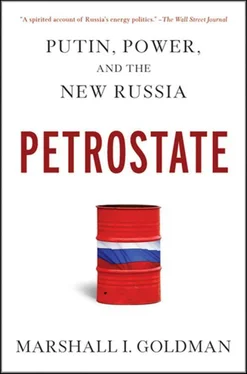To ensure that such bonuses would be forthcoming, the factory manager devoted virtually his whole effort to searching for ways to increase production. Over time, Soviet managers developed a fine-honed sense of just how this should be done. Those who did not succeed were discarded along the way. Soviet economists soon discovered, however, that a single-minded devotion to quantity led managers not only to ignore quality and variety but to dispense with them. Every time, for example, a machine was shut down to change size or to improve the process, less time was available for production. Occasionally a change in process might lead to faster or improved production, but there was always the possibility that the innovation would not succeed and production would not increase. By contrast, there was always the certainty that in switching production models, production would be curtailed at least temporarily. Because few managers were willing to take such risks, quality improvement inevitably suffered. In the Soviet system, innovation was disruptive and therefore to be avoided. 16
For the oil drillers, this meant that the steel manufacturers they depended on had no incentive to produce or even contemplate producing the higher grade qualities of steel. 17In his colorful way, Nikita Khrushchev put it vividly when he complained: “The production of steel is like a well-traveled road with deep ruts; here even blind horses will not turn off, because the wheels will break. Similarly, some officials have put on steel blinkers; they do everything as they were taught in their day. A material appears which is superior to steel that is cheaper, but they keep on shouting ‘steel, steel, steel!’ “ 18While this attack was delivered in the context of criticism of the planners’ inability to switch to new, more sophisticated and innovative industries like electronics, computers, and chemicals, Khrushchev’s complaint was equally valid when addressed to the need for qualitative improvements within the steel industry itself.
The planning system was equally ill-suited for locating new deposits. Since planning targets were usually spelled out in terms of some physical measure, for those in agencies like the Ministry of Geology whose work involved drilling, the most reasonable index seemed to be the number of meters drilled. Supposedly the more meters drilled, the better the performance. But Soviet geologists soon discovered that the deeper they drilled the longer it took them and the less drilling they did. 19As a result, the geologists quickly developed the practice of drilling shallow holes. As an article in Pravda pointed out, “Deep drilling means reducing the speed of the work and reducing the group’s bonuses.” 20A description of the area sounded more like a smallpox rather than a mining report. “In some places, the land is becoming increasingly pitted with shallow, exploratory holes drilled in incessant pursuit of a larger number of total meters drilled.” It was not surprising, therefore, that “there are geological expeditions in the Republic of Kazakhstan that have not discovered a valuable deposit for many years, but are counted among the successful expeditions, because they fulfill their assignment in terms of meters. The groups that conscientiously ‘turn up’ deposits are often financial losers.”
Moreover, even if the drillers from the Ministry of Geology found a field, they bore no responsibility for determining its size. Consequently, the actual producing ministries also had to maintain their own drilling units. In some instances there were two and on occasion as many as three separate drilling agencies duplicating one another’s work. 21Undoubtedly it would have been much more efficient to base the drilling team’s compensation on the amount of raw materials actually recovered, but this was resisted by the planning agencies and the Ministry of Geology, which feared such a shift would disrupt its planning procedures. As often happened, they had confused the means— that is, how many meters are drilled—with the end, how much oil was found. Another way the Soviet planning system created institutional blockages to a more efficient utilization of mineral deposits was that responsibility for production and drilling was usually divided up among several large ministries or state committees such as the Ministry of the Chemical Industry, the Ministry of the Gas Industry, and the Ministry of the Petroleum Industry.
Unfortunately, nature did not always break itself up into the same neat and precisely defined categories. This also helps to explain why so much natural gas was burned off, that is, flared. Virtually none of the flaring was done by enterprises within the Ministry of the Gas Industry. Most of it was done by drilling units working within the Ministry of the Petroleum Industry. They produced the gas as a by-product in extracting petroleum, which, after all, was their main concern. 22Therefore, the plan fulfillment efforts of the Ministry of the Petroleum Industry set out in tons of petroleum produced were little affected by what happened to the by-product, natural gas (a by-product of petroleum extraction). Since Petroleum Ministry officials received no credit for producing gas, they did not concern themselves with building gas pipelines to move the gas to market. Why should they bother? To rid themselves of the nuisance, more often than not they simply flared it.
THE CIA’S PREDICTION OF A SHARP DROP IN PETROLEUM PRODUCTION
Given so many counterproductive and illogical practices, it is easy to see how CIA analysts could conclude that despite the Soviet Union’s large land mass, Soviet petroleum output would drop sharply. Since the oil field operators would most likely continue to flood more and more of their best oil wells, it seemed inevitable that before long the USSR was bound to become a net petroleum importer. Moreover, were production to continue to fall as the CIA predicted, the USSR was sure to find itself with problems that extended far beyond the Ministry of Petroleum. Petroleum was virtually their only hard currency export, and if they could not export it they would not be able to earn the hard currency they needed to pay for imports. Were that to happen, they would be unable to fund the $6.5–8 billion a year they periodically spent on meat and grain imports. 23As it was, even with the petroleum exports they frequently ended up with a trade deficit. 24In 1975 and again in 1981, for example, the Soviet trade deficit exceeded $4 billion. It would have become even higher if the Soviets had been unable to respond by increasing their petroleum exports. 25
RUSSIAN PETROLEUM AS DIPLOMATIC WEAPON
The CIA rightly concerned itself with the Soviet Union’s ability to export petroleum. The earlier surge in Soviet petroleum output and the corresponding increase in exports in the 1960s and 1970s provided Soviet leaders with a particularly effective economic and foreign policy weapon. It opened doors in the third world for Soviet ideology and diplomatic initiatives that otherwise might have remained closed or just half open. Countries in the struggling regions of Asia, Africa, and Latin America in that era generally welcomed the radical rhetoric propagated by the USSR but often hesitated to turn their backs completely on their former colonial masters for fear of economic reprisals and export embargoes. In particular, radical leaders in the third world feared that if they became too tied to the Soviet Union or went so far as to nationalize the Western oil companies’ distribution network as did Cuba and Ceylon (renamed Sri Lanka in 1972), the United States would arrange with the so-called Seven Sisters capitalist oil companies to embargo the delivery of the petroleum essential to running their economies. 26
Читать дальше












